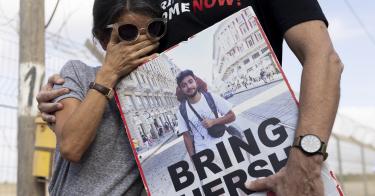“Where does Hamas go from here?” read a Washington Post headline in the wake of the killing of Hamas leader Ismail Haniyeh on July 30 in Tehran.
The United States didn’t wait to find out. It dramatically increased its naval posture in the Middle East in an effort to deter Iran from an escalatory retaliation against Israel.
That attack hasn’t materialized, suggesting that the assembled firepower has indeed made Iran think twice. But recent events—the execution of Hersh Goldberg-Polin in the Gaza Strip, the attack on U.S. forces in Iraq that injured 17 and increasing Houthi action against commercial shipping in the Red Sea—indicate that Iran is not so much standing down as using its terrorist proxies to test the Biden-Harris administration. Iran wants to know if the United States would actually use any of the military capacity at its disposal or if it’s just for show.
Goldberg-Polin’s murder is the most egregious provocation to date in a disturbing shift of tactics for Hamas. In the Oct. 7 attack on Israel, the terrorist group took dozens of civilians hostage, including dual Israeli-American citizens such as Goldberg-Polin. Until recently, Hamas’ general policy appeared to be to try to keep them alive, albeit under horrific circumstances, to use as bargaining chips in negotiations with Israel.
Goldberg-Polin, for example, had had his arm blown off below the elbow and would have required significant medical attention. But as Israeli forces closed in on the location of the six young people kidnapped from the Nova Music Festival, Hamas didn’t abandon them or try to fight the Israeli military. It summarily executed the hostages.
The grim discovery of their bodies had the intended shocking effect, and Israelis took to the streets to demand the return of the other hostages. Anger has grown against the Israeli government for not making sufficient concessions to extract them in time. Of course, the hostages’ families would give anything for their release, which is only natural. Still, the role of the government is not only to free them but also to prevent others from being targeted and made vulnerable by the conditions of their release.
Most Israelis seem to understand this terrible dilemma in the cold light of day. But the Biden-Harris administration, determined to get some sort of deal with Hamas to please their domestic political base, has decided to make the Israeli government the party responsible for prolonging the hostages’ captivity.
Shortly after Goldberg-Polin’s death was confirmed, President Biden was asked if Israeli Prime Minister Benjamin Netanyahu was doing enough to get the hostages out. Instead of putting the blame where it belongs—on Yahya Sinwar, the only surviving Hamas mastermind of the Oct. 7 attacks who would have ordered Goldberg-Polin’s murder—the president snapped, “No.”
Mr. Biden’s silence on Mr. Sinwar revealed an uncomfortable reality: Beyond anodyne news releases, the White House has no intention of taking retaliatory action for the execution of a U.S. citizen. Instead, the administration will continue prioritizing a cease-fire at any cost in response to increasingly intense domestic political pressure from young and Arab American voters.
Chances are that Mr. Sinwar and his Iranian paymasters know this perfectly well. That’s surely what led to the execution of some high-value hostages in an attempt to force Israel and America into the security concessions that would allow Hamas to survive and ultimately rearm. Mr. Sinwar judges that due to political concerns, there will be no U.S. repercussions for this act, so it’s worth expending such precious leverage in time to get a cease-fire into place before Nov. 5. At this point, he could be facing a more staunch Israeli ally in Washington who would have no compunction taking action against the murderer of an American citizen.
Another major flaw in the Biden-Harris policy of pressuring Israel to agree to a cease-fire is that it assumes Hamas will honor its commitments and release the agreed-to number of hostages (or their bodies) on schedule. Even if they can be found, the fantasy that all the hostages will come home when a cease-fire is signed is just that—the current agreement has weeks, if not months, scheduled for phased releases if Hamas complies after a cease-fire.
While the Biden-Harris administration may congratulate itself that the U.S. military buildup in the Middle East helped it dodge a major Iranian attack on Israel that would derail the goal of a cease-fire, our leaders ignore the reality that through its terrorist proxies, Iran is methodically upping the ante in Iraq, in the Red Sea and now most dangerously in Gaza, and learning that there will be no response.
This is not so much the establishment of deterrence as it is the revelation of a paper tiger.




